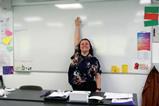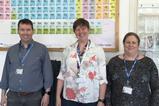Find out what secondary teachers, heads of department and technicians have to say about the rewards and challenges of their profession
The Royal Society of Chemistry (RSC) has just released the findings of its 2022 Science Teaching Survey. Science teachers, department heads, school leaders and technicians were invited to take part and share their views in the annual survey. The findings contain invaluable information about the rewards and challenges of working in science education in 2022.

The survey was distributed to secondary schools across the UK and Ireland, between February and April 2022. There were 3742 complete responses to the survey questions. The RSC team also conducted 60 in-depth interviews, where they asked respondents about the challenges and rewards of delivering a high-quality science education. The findings show that there are shared concerns across the nations, despite differences in their teaching landscapes.
The research offers school leadership teams significant insights, which can provide direction on where they might need to address staff retention issues and focus on well-being. And education policymakers can use the findings to uncover key areas affecting science education to inform their strategic decisions going forward.
Read about the findings
You can read a summary of the findings and the actions the RSC is taking to drive positive change in the education sector. You will also find links to learn about the detail behind each of the main findings. You’ll discover how staffing inequalities are affecting schools and teachers, why teachers are leaving the profession, why content and time are at odds with each other, about barriers to practical work, and much more.
Essential insights
On the ground, it’s a challenging time to be teaching or working as a technician. The recruitment and retention crisis means school and college science departments are bearing the weight (and shortfall) of the exodus of teachers and technicians.
The honest feedback from these key players can provide school leadership teams with the building blocks they need for positive change. For example, a science and physics teacher from Scotland shares that, ‘The curriculum has too much in it, and then you end up having to rush through things to get everything covered, which is the biggest problem. There’s not enough time.’
A science head of department in England provides a frank picture of their day-to-day challenges: ‘It is a highly pressurised job that is often disproportionately and unfairly so. Incompetence is not held accountable, and yet hard and efficient work is punished with higher expectations and more work.’
Direction for a better future
One of the RSC’s strategic priorities is to support chemistry teachers in the UK and Ireland across every stage of education. The RSC is using the survey findings and in-depth interviews to drive positive change in the education sector. This includes the ongoing commitment to provide the resources and support that teaching staff need. By understanding the needs and challenges teachers face in different regions and circumstances, the RSC can build a body of evidence to influence government policy, prioritise programmes of support for teachers and measure the impact of its work.
The 2022 findings will be used as a baseline to measure any shifts in future surveys. The plan for the 2023 survey is to delve into specific themes, including: attitudes towards the curriculum; teachers’ access to CPD; well-being and job satisfaction; the challenges of teaching in areas of high socioeconomic deprivation; and the deployment of subject experts.
Helen Pain, CEO of the RSC, thanks everyone who participated, adding: ‘Your contribution helps us to focus our efforts where they are most needed.’



















No comments yet